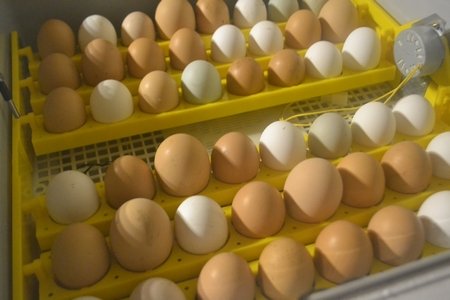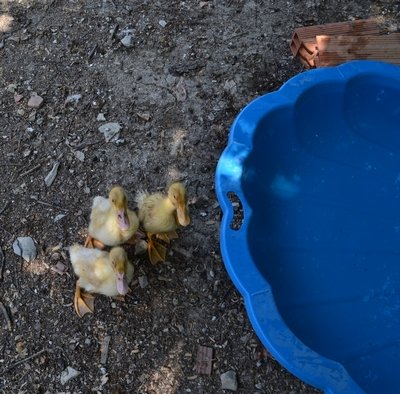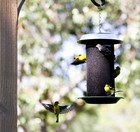Raising Ducklings Artificially or Naturally
See how to raise
ducklings naturally, artificially with an incubator, know what to feed
them and how to prevent
them from drowning.
Yes, ducklings do drown if they are introduced to water before their secondary feathers have emerged. So it is important not to allow them access to water that may put them in danger.
So who doesn't like ducklings? I think I can safely say, very few of us. And for those of you who are thinking of raising a couple of these fellas, you need to know how to incubate them successfully and how to look after them so that they will give you those eggs or meat that you want to keep them for.
If you are unsure as to what duck breed you should be raising, then see our article on raising ducks to give you some indication of which meat birds, egg birds and dual purpose birds are recommended.
As with chicken eggs, you need to keep your temperatures around 95 degrees F. (38 degrees C) and the humidity should be around 45 to 55 % until the last few days when you want to see if you can crank it up to between 60 to 80%.
The more I incubate chickens and eggs, the more I realize that if you manage to fall within quite a large range of temperatures and even humidities, you will still have a good success rate. As long as your humidity is not too high in the beginning where you will end up drowing the embryos, things should turn out okay.

Incubating the eggs in an automatic incubator
Recently, I hatched 33 chickens out with a fairly stable humidity with an 85% hatch rate. This week I hatched a further 7 chicken eggs that were put among the duck eggs in the incubator with a very low humidity as the incubator was playing up, with a 100% hatch rate.
In the same batch of these 7 chickens were 15 duck eggs. Again I had a 100% hatch rate.
Many people swear by the dry incubation method, and as a result of my experiments, I am beginning to swing that way too. Time will tell.
Once out of the incubator you will have to set up a brooding lamp with a 250 watt bulb and a warm, dry place to keep them for at least 3 weeks before you can turn the lamp off. This gives them time to develop their secondary feathers and generate their own warmth.
Place the bulb (I use a red one) inside the brooder box about 6 inches from the bottom. Every week I raise the lamp about an inch, which lowers the temperature about 5 degrees accordingly so that they don't overheat.
You can look at how they behave in the brooder box to see if they are either too hot or too cold. If they are all huddled together under the lamp they are cold. If they are all spread far away from the brooder they are trying to escape the heat. If they are randomly scattered around the brooder box, some under the lamp, others away from the lamp, then the temperature is good for them. Remember, outside temperatures, or room temperatures will also affect where you place the lamp in relation to your ducklings.
When you do decide to rescue them from their shells, make sure that you have left them long enough to see that they definitely can't get out on their own, and only then intervene. However, you don't want to leave them more than a day, as they will probably be dead by then. It is a fine line to tread.
What I do is remove just the outer shell, and then put warm water on the membrane, softening it, and removing it in strategic places. You want to make sure that there is no chance of damaging blood vessels so that you end up killing the duckling. It should be done slowly, carefully and with a certain amount of skill.
So, the best way to raise ducklings from an incubator is to raise the humidity, and then have lockdown. In other words, do not open up the incubator again until you have all your ducklings hatched.
To raise the humidity, without raising the temperature, I place a wet, clean tea towel under the hole where I can inject water if I need to keep it wet over the next few days. This allows me to have control over the humidity and I won't need to open the top.
If you are going to use a broody hen or duck, then make sure that you moisten the outside area of the nest with a spray bottle every day, especially on very warm or dry days as ducks need a fair amount or moisture to hatch well.
Watch your hen. When I was a novice at looking after chickens, I was appalled when a broody hen of mine died on the nest. It turned out that she was such a good brooder that she never left the nest to eat or drink and literally starved herself to death.
So make sure that your surrogate mother hen or duck leaves the nest to feed, get some exercise and get water.
Yes, ducklings do drown if they are introduced to water before their secondary feathers have emerged. So it is important not to allow them access to water that may put them in danger.
So who doesn't like ducklings? I think I can safely say, very few of us. And for those of you who are thinking of raising a couple of these fellas, you need to know how to incubate them successfully and how to look after them so that they will give you those eggs or meat that you want to keep them for.
If you are unsure as to what duck breed you should be raising, then see our article on raising ducks to give you some indication of which meat birds, egg birds and dual purpose birds are recommended.
Raising Ducklings Artificially with an Incubator
To hatch ducklings using an incubator you have to be a little more patient than you would with chicken eggs. For where a chicken egg can take anything from 19 to 22 days to hatch, with 21 days being the norm. The norm for ducks is 25 to 28 days with even a few days either side.As with chicken eggs, you need to keep your temperatures around 95 degrees F. (38 degrees C) and the humidity should be around 45 to 55 % until the last few days when you want to see if you can crank it up to between 60 to 80%.
The more I incubate chickens and eggs, the more I realize that if you manage to fall within quite a large range of temperatures and even humidities, you will still have a good success rate. As long as your humidity is not too high in the beginning where you will end up drowing the embryos, things should turn out okay.

Incubating the eggs in an automatic incubator
Recently, I hatched 33 chickens out with a fairly stable humidity with an 85% hatch rate. This week I hatched a further 7 chicken eggs that were put among the duck eggs in the incubator with a very low humidity as the incubator was playing up, with a 100% hatch rate.
In the same batch of these 7 chickens were 15 duck eggs. Again I had a 100% hatch rate.
Many people swear by the dry incubation method, and as a result of my experiments, I am beginning to swing that way too. Time will tell.
Once out of the incubator you will have to set up a brooding lamp with a 250 watt bulb and a warm, dry place to keep them for at least 3 weeks before you can turn the lamp off. This gives them time to develop their secondary feathers and generate their own warmth.
Place the bulb (I use a red one) inside the brooder box about 6 inches from the bottom. Every week I raise the lamp about an inch, which lowers the temperature about 5 degrees accordingly so that they don't overheat.
You can look at how they behave in the brooder box to see if they are either too hot or too cold. If they are all huddled together under the lamp they are cold. If they are all spread far away from the brooder they are trying to escape the heat. If they are randomly scattered around the brooder box, some under the lamp, others away from the lamp, then the temperature is good for them. Remember, outside temperatures, or room temperatures will also affect where you place the lamp in relation to your ducklings.
Tips for Raising Ducklings Successfully Inside the Incubator
Like chickens, after the ducklings emerge from their eggs they can be kept in the incubator for a couple of days without having to worry about them. I have opened up the incubator and removed chicks and ducklings before others have hatched, but it is a risky business. Depending on where they are in the process of emerging, you may find that the lining of the shell then sticks to them like shrink wrap, and unless you intervene (and you really shouldn't, but if you don't they will never be able to emerge, and they will die any way.)When you do decide to rescue them from their shells, make sure that you have left them long enough to see that they definitely can't get out on their own, and only then intervene. However, you don't want to leave them more than a day, as they will probably be dead by then. It is a fine line to tread.
What I do is remove just the outer shell, and then put warm water on the membrane, softening it, and removing it in strategic places. You want to make sure that there is no chance of damaging blood vessels so that you end up killing the duckling. It should be done slowly, carefully and with a certain amount of skill.
So, the best way to raise ducklings from an incubator is to raise the humidity, and then have lockdown. In other words, do not open up the incubator again until you have all your ducklings hatched.
To raise the humidity, without raising the temperature, I place a wet, clean tea towel under the hole where I can inject water if I need to keep it wet over the next few days. This allows me to have control over the humidity and I won't need to open the top.
Raising Ducklings Naturally
When I talk about raising ducklings naturally, I am referring to the fact that you can use either a broody hen or a broody duck to hatch the eggs. Not all ducks are good mothers, so this is why it is better to find a hen or duck that will be. You have more chance of finding a broody hen, than a duck.If you are going to use a broody hen or duck, then make sure that you moisten the outside area of the nest with a spray bottle every day, especially on very warm or dry days as ducks need a fair amount or moisture to hatch well.
Watch your hen. When I was a novice at looking after chickens, I was appalled when a broody hen of mine died on the nest. It turned out that she was such a good brooder that she never left the nest to eat or drink and literally starved herself to death.
So make sure that your surrogate mother hen or duck leaves the nest to feed, get some exercise and get water.
When Raising Ducklings What do you Feed them?

Some of my ducklings ready for their first swim
If I find that some of the ducklings are struggling a bit, I cook some eggs up, chop up the yolks, add some finely chopped parsley and feed it to them over 2 days. This builds their strength up very quickly, and I have never lost a chick or duck after hatching with this method. However, you don't want to feed them the eggs past day 2 as it is too high in protein for longterm feeding.
After 3 weeks you can then change over from the starter feed to the laying feed if you are keeping ducks for eggs. I tend to keep my ducklings inside the barn for the first 2 months, just because I have a lot of predators around, and I don't want them to catch a chill in the long grass. Therefore, because they don't have ready access to greens, I continue feeding them parsley, as well as some greens to munch on during the day like cabbage leaves, some lettuce, dandelion leaves, etc.
Allow your ducklings to have access to plenty of fresh water. Place the water initially in jar lids, or even coffee lids (I am thinking of the deep Nescafe lid here). Allowing them to swim too early will result in drowning. So don't give them access to a pond until they have all their secondary feathers. Make sure you watch them the first time you allow them to swim, just in case you have misjudged the timing, and there is still time for rescue operations!
Finally, grit is important too, to their diet, and this should be on offer separately in another receptacle. Don't mix the grit with the food, just allow them free choice, and they will take what they need.
When you move them to their new house, do so when they are fairly young, as ducks are very prone to stress when moved. Not only can they stop egg laying, if they are adult birds, but they can also start moulting due to the stressful change.
Conclusion to Raising Ducklings
Duck can be a very economical and hardy birds to keep on the farm. They are good foragers, and still reward you handsomely in eggs and meat.Look for good layers in your flock. They will be the first ones out the door, and the last ones to come in at night. However, that also means that these ducks are a prime target for predators, so try and keep your ducks as safe as possible, as they are a delightful addition to any farm scene and well worth the effort. Duck eggs are excellent for baking, and far superior to chicken eggs.
Did you find this page helpful?
Sharing is a way of saying, "Thanks!"
Follow Us and Keep Up to Date
Don't miss out on our latest news and articles. Sign up for our free monthly e-zine!
Go from Raising Ducklings back to Farm AnimalsGo back to the Home Page






New! Comments
Do you have something of value to add? Leave me a comment in the box below.